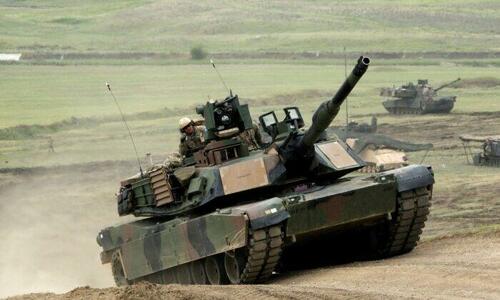
Authored by Mike Fredenburg via The Epoch Times,
Thirty-one M1 Abrams tanks were delivered to Ukraine in September/October of 2023 only to effectively disappear from the news for about four months. Now with the reported destruction of the fourth M1 Abrams tank in a span of 12 days, they are back in the news. And the fact they are back in the news is a sign of how desperate things are for Ukraine.
There are a number of plausible reasons that Ukraine did not deploy the Abrams and their freshly trained crews to the frontlines until just recently, and none of them are mutually exclusive.
First, while a properly supported M1 Abrams is very effective, it is highly maintenance intensive and guzzles gas. So, before they could be used at all effectively, the proper support infrastructure and logistics needed to be in place. Also, by the time the Abrams could be properly supported by Ukraine, it was facing heavily fortified lines that included tank traps, trenches, tank-killing drones, massed artillery fires, and minefields that have proved devastating to Ukraine’s other tanks. And with the failure of Ukraine’s counteroffensive, it made sense to keep the gas-hungry/maintenance-intensive Abrams in reserve for defensive operations when Russia inevitably began its own offensive operations.
All of the above reasons are legitimate, but arguably the biggest reason may be that it was believed by Ukraine and the Biden administration that the propaganda value Russia would reap from their destruction was far greater than any value they would bring to Ukraine in uselessly throwing them against the fierce and devastatingly effective defenses of the Surovikin Line.
That Russia recognized the propaganda value of destroying Western “wonder weapons” is demonstrated by its creation of tank-killer groups (TKGs) whose focus is destroying and/or capturing any modern armor provided to Kyiv by the United States and its NATO allies.
To encourage the TKGs, Russian businesses and officials reportedly offered cash bounties for the destruction of Western military equipment in Ukraine. Aleksandr Osipov, the governor of Russia’s Zabaikalsky Region, reportedly signed an order in January 2023 promising local soldiers 3 million rubles ($37,000) for capturing an operational Leopard 2 tank, or 1 million rubles ($12,000) for destroying one. Fores, a Russian chemical manufacturing company, issued a press release stating that “Fores will pay 5 million rubles [$70,700 U.S.] for the first trophy. The payment for every next one [Leopard 2 or Abrams] … will be 500,000 rubles [$7,070 U.S.].”
With Russians paying special attention to the Abrams, it is not hard to imagine that Ukraine and the Biden administration quickly agreed that rushing the “game-changing” Abrams into lethal environs to become propaganda fodder was not the favored course of action.
However, with the devastating losses in men and materiel suffered by Ukraine, Ukraine is running low on everything, including ammunition, men, morale—and tanks. And with Russia having shifted from conservation of forces operations to limited offensive operations, denying fodder for Russia propaganda has taken a back seat to battlefield realities, and Ukraine is desperately throwing everything it has into defensive operations to slow down Russian advances. And that everything includes the 31 Abrams.
How the Abrams were destroyed illustrates why the Ukraine-Russian battlefield is arguably the most hostile environment for tanks ever. According to unverified reports from Russian media, the first Abrams was destroyed when it came under attack by units of the Samara 15th Motorized Rifle Brigade after being spotted by a reconnaissance drone. First it was struck by a kamikaze drone and then finished off by grenade launchers. The second Abrams was put out of action by Russia’s Army Group Center, which successfully used two first-person-view unmanned aerial vehicles (UAVs). The third Abrams was lost in battle to a T-72B3 main battle tank that used its powerful gun-fired anti-tank missile, something Abrams do not have, to take out the Abrams with a single shot. The fourth Abrams tank looks like it was destroyed by artillery.
The use of the gun-fired anti-tank missiles such as the 9M119M Refleks, which is standard on advanced T-72 tanks, including the T-72B3 and the highly cost-effective T-90M, allows Russian tanks to outrange Abrams and get in the first shot. This capability illustrates the fact that modernized T-72 tanks, when properly employed and supported, are a threat to even the most advanced of Western tanks.
As was to be expected, the destruction of the M1 Abrams tanks has been trumpeted by Russian media and social media. But given that both Challenger and Leopard 2 tanks have been destroyed in the last few months, and that Ukrainian morale is already low, losing the Abrams at this stage of the war probably had less impact than if they had been destroyed shortly after arriving in Ukraine.
Still, having three M1 Abrams tanks destroyed in just over a week, and the fourth destroyed within a 12-day span, did provide a boost for Russian morale that Ukraine and the United States would dearly love to have avoided.
Authored by Mike Fredenburg via The Epoch Times,
Thirty-one M1 Abrams tanks were delivered to Ukraine in September/October of 2023 only to effectively disappear from the news for about four months. Now with the reported destruction of the fourth M1 Abrams tank in a span of 12 days, they are back in the news. And the fact they are back in the news is a sign of how desperate things are for Ukraine.
There are a number of plausible reasons that Ukraine did not deploy the Abrams and their freshly trained crews to the frontlines until just recently, and none of them are mutually exclusive.
First, while a properly supported M1 Abrams is very effective, it is highly maintenance intensive and guzzles gas. So, before they could be used at all effectively, the proper support infrastructure and logistics needed to be in place. Also, by the time the Abrams could be properly supported by Ukraine, it was facing heavily fortified lines that included tank traps, trenches, tank-killing drones, massed artillery fires, and minefields that have proved devastating to Ukraine’s other tanks. And with the failure of Ukraine’s counteroffensive, it made sense to keep the gas-hungry/maintenance-intensive Abrams in reserve for defensive operations when Russia inevitably began its own offensive operations.
All of the above reasons are legitimate, but arguably the biggest reason may be that it was believed by Ukraine and the Biden administration that the propaganda value Russia would reap from their destruction was far greater than any value they would bring to Ukraine in uselessly throwing them against the fierce and devastatingly effective defenses of the Surovikin Line.
That Russia recognized the propaganda value of destroying Western “wonder weapons” is demonstrated by its creation of tank-killer groups (TKGs) whose focus is destroying and/or capturing any modern armor provided to Kyiv by the United States and its NATO allies.
To encourage the TKGs, Russian businesses and officials reportedly offered cash bounties for the destruction of Western military equipment in Ukraine. Aleksandr Osipov, the governor of Russia’s Zabaikalsky Region, reportedly signed an order in January 2023 promising local soldiers 3 million rubles ($37,000) for capturing an operational Leopard 2 tank, or 1 million rubles ($12,000) for destroying one. Fores, a Russian chemical manufacturing company, issued a press release stating that “Fores will pay 5 million rubles [$70,700 U.S.] for the first trophy. The payment for every next one [Leopard 2 or Abrams] … will be 500,000 rubles [$7,070 U.S.].”
With Russians paying special attention to the Abrams, it is not hard to imagine that Ukraine and the Biden administration quickly agreed that rushing the “game-changing” Abrams into lethal environs to become propaganda fodder was not the favored course of action.
However, with the devastating losses in men and materiel suffered by Ukraine, Ukraine is running low on everything, including ammunition, men, morale—and tanks. And with Russia having shifted from conservation of forces operations to limited offensive operations, denying fodder for Russia propaganda has taken a back seat to battlefield realities, and Ukraine is desperately throwing everything it has into defensive operations to slow down Russian advances. And that everything includes the 31 Abrams.
How the Abrams were destroyed illustrates why the Ukraine-Russian battlefield is arguably the most hostile environment for tanks ever. According to unverified reports from Russian media, the first Abrams was destroyed when it came under attack by units of the Samara 15th Motorized Rifle Brigade after being spotted by a reconnaissance drone. First it was struck by a kamikaze drone and then finished off by grenade launchers. The second Abrams was put out of action by Russia’s Army Group Center, which successfully used two first-person-view unmanned aerial vehicles (UAVs). The third Abrams was lost in battle to a T-72B3 main battle tank that used its powerful gun-fired anti-tank missile, something Abrams do not have, to take out the Abrams with a single shot. The fourth Abrams tank looks like it was destroyed by artillery.
The use of the gun-fired anti-tank missiles such as the 9M119M Refleks, which is standard on advanced T-72 tanks, including the T-72B3 and the highly cost-effective T-90M, allows Russian tanks to outrange Abrams and get in the first shot. This capability illustrates the fact that modernized T-72 tanks, when properly employed and supported, are a threat to even the most advanced of Western tanks.
As was to be expected, the destruction of the M1 Abrams tanks has been trumpeted by Russian media and social media. But given that both Challenger and Leopard 2 tanks have been destroyed in the last few months, and that Ukrainian morale is already low, losing the Abrams at this stage of the war probably had less impact than if they had been destroyed shortly after arriving in Ukraine.
Still, having three M1 Abrams tanks destroyed in just over a week, and the fourth destroyed within a 12-day span, did provide a boost for Russian morale that Ukraine and the United States would dearly love to have avoided.
Loading…




